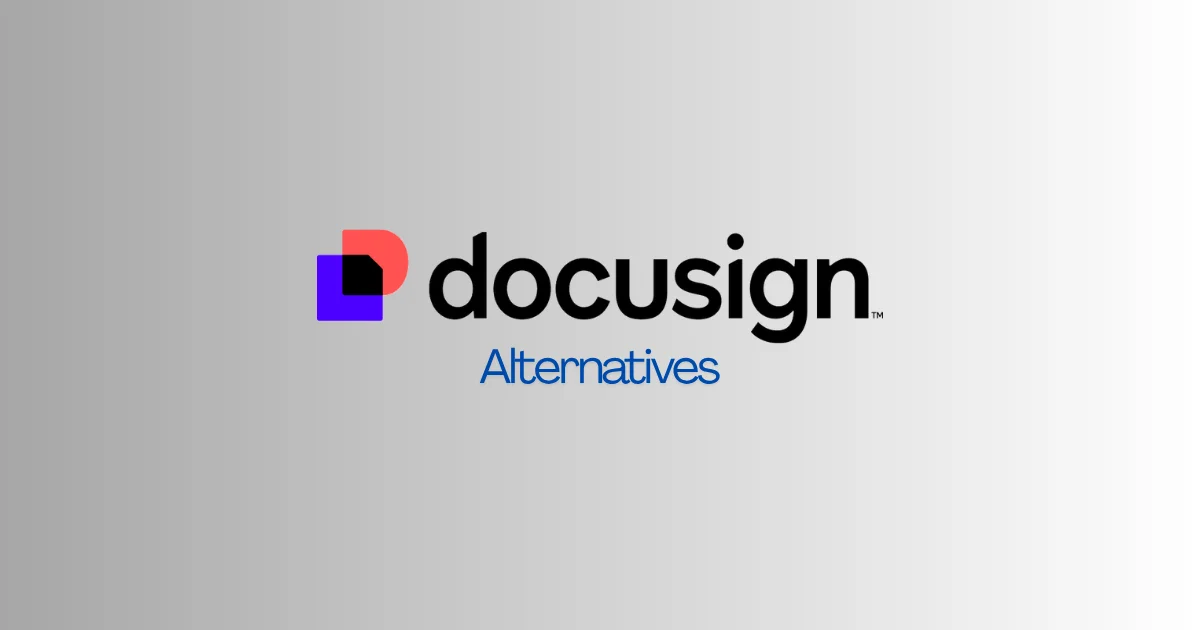Tired of DocuSign’s pricing or looking for more flexibility in your e-signing workflow? You’re not alone. While DocuSign has long been the gold standard for electronic signatures, it’s not the only player in town — and for many users, it’s not the perfect fit anymore.
Whether you want a simpler interface, better integration with your tools, or just a more budget-friendly solution, there are plenty of DocuSign alternatives that do the job — some even better. From freelancers to large teams, switching to the right platform can streamline contract signing, save money, and speed up your workflow.
In this guide, we’ve handpicked the 10 best DocuSign competitors in 2026 — thoroughly compared — to help you choose the one that fits your business needs perfectly.
Key Points to Consider Before Switching Over to DocuSign Alternatives
Switching from DocuSign to another e-signature tool isn’t a big deal — but before you make the jump, it’s worth pausing to check a few important things. Not every alternative will offer the same value, security, or legal coverage, so keep these three factors in mind:
- Pricing That Actually Saves You Money: DocuSign offers a limited free plan (unlimited self-signing, 3 sends/month) and a 30-day trial. Don’t switch unless the alternative gives you better value for the price.
- Security You Can Trust: E-signatures need protection. Look for features like encryption, secure storage, and two-factor authentication to keep your documents safe.
- Legal Compliance That Holds Up: The platform must follow laws like ESIGN, UETA, or eIDAS. Without proper compliance, your e-signatures may not be legally valid.
Explore the 10 Best DocuSign Alternatives in 2026 and Choose the Right One for Your Business:
Based on hands-on research and real user feedback, we’ve carefully reviewed and compared 10 of the top DocuSign alternatives available in 2026. Each option includes a breakdown of core features, pros and cons, transparent pricing, and a clear comparison with DocuSign to help you make an informed decision. Whether you’re a freelancer, a growing team, or a large organization, this guide is designed to help you find a trusted tool that fits your needs better.
1. Dropbox Sign (formerly HelloSign)

If your document signing requirement is limited, this can be a good alternative to DocuSign. It is a low-budget digital platform for document signing. Formerly known as HelloSign, Dropbox Sign is equipped with AI-enabled legal document standards. Through an electronic request, you can imprint signatures on documents.
Despite being low-cost, it offers several features, including an easy way to create document templates and specify business-related “Condition Fields.” Operationally, it is simple and, unlike DocuSign, it does not have an advanced routing protocol.
Pros:
- Suitable for both individuals and business establishments. Ease of use is the same in both cases.
- Easy to navigate and integrates with Slack and Google Workspace. Workflows can be streamlined easily.
- You can track signature requests and retrieve documents without hassle. Phase-wise signature management is simple.
Cons:
- It lacks offline signing. If you run a large company, this may not be suitable as it cannot handle multiple signature management.
- It has performance issues. Loading and syncing documents may take longer.
- Editing difficulties: If you want to edit a document after sending, you must re-upload it and re-add the signature field.
Dropbox Sign Plans and Pricing:
All Dropbox Sign plans include unlimited signature requests with no hidden fees, plus a 30-day free trial to explore premium features.
- Essentials (Individual):
- Monthly: $20 USD/month
- Annually: $15 USD/month ($180 USD billed yearly)
- Monthly: $20 USD/month
- Standard (Small Team):
- Monthly: $30 USD/user/month
- Annually: $25 USD/user/month (starting at $600 USD billed yearly)
- Monthly: $30 USD/user/month
- Premium (Large Team):
- Monthly: Custom pricing available (contact sales)
- Annually: Custom pricing available (contact sales)
- Monthly: Custom pricing available (contact sales)
Check the Dropbox Sign pricing details
Is Dropbox Sign right for me?
Overall, Dropbox will suit you if you don’t use a large number of signatures each month. As an individual or small business owner, you will find it quite useful.
2. SignNow

This e-signing platform is gaining popularity among small business owners. Companies operating in the SME sector mostly use SignNow. It offers several useful features like Custom Branding, Bulk Sending, and Fillable Templates.
Feature-wise, SignNow and DocuSign are almost the same, though DocuSign offers some extra features. With SignNow, you can integrate your signature with 1Password, WordPress, and Typeform. SignNow makes quick document deployment easy.
Pros:
- Affordable compared to other eSignature platforms.
- Easy-to-use electronic signature features.
- You can check the signature status and track signed documents.
Cons:
- No eWitness functionality, which is important for certain legal documents.
- API issues like connection downtime may delay integration.
- Updating templates can be problematic, causing issues in sending contracts or documents.
airSlate SignNow Plans and Pricing:
All airSlate SignNow plans include unlimited users and essential eSignature features with no hidden fees. Enjoy a 7-day free trial to explore its tools before committing, and save up to 60% with annual billing.
Business
- Monthly: $20/user/month
- Annually: $8/user/month ($96 billed yearly)
Includes core eSignature tools like document sending, templates, mobile access, and cloud storage integration.
Business Premium
- Monthly: $30/user/month
- Annually: $15/user/month ($180 billed yearly)
Adds advanced collaboration features including bulk sending, signing links, reminders, payment collection, and document grouping.
Enterprise
- Monthly: $50/user/month
- Annually: $30/user/month ($360 billed yearly)
Designed for larger teams needing conditional logic, smart fields, signer uploads, and enhanced security tools.
Site License
- $1.50 per signature invite (monthly and annually)
Includes all Enterprise features plus API access, volume discounts, CRM/ERP integration, and compliance support for complex workflows.
Check the SignNow pricing details.
Is SignNow right for me?
If your signature volume is not high, this will suit you. Freelancers, individuals, or small businesses will find it useful.
3. Adobe Sign
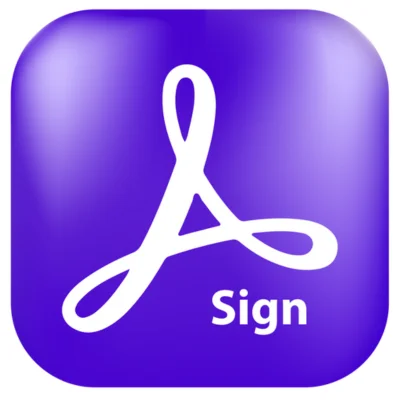
This eSignature platform is a good alternative to DocuSign, especially for PDF use. Based on cloud technology, Adobe e-Sign allows users to view, send, and electronically sign PDF documents.
Adobe Sign does not offer certain features like customizable templates, which DocuSign and some alternatives provide. However, it’s a good choice if you need collaboration tools, markup features, and version comparison. It integrates seamlessly with Adobe Document Cloud and other Adobe products.
Pros:
- Integration with other Adobe tools, including Acrobat Pro, is a key benefit.
- Quick and easy signing without printing or scanning.
- Can be integrated with Microsoft, Salesforce, ServiceNow, Workday, SugarCRM, and NetSuite.
Cons:
- Adding text boxes to documents can be difficult.
- Lacks advanced analytics and online notarization, which DocuSign provides.
- Not ideal for legal professionals handling complex documentation.
Adobe E-Signature Plans and Pricing:
If you’re considering Adobe for managing PDFs and collecting e-signatures, here’s what to expect from their current plans. You can try Acrobat Pro free for 7 days or test Acrobat Sign Solutions for 30 days without paying a cent — just remember to cancel before the trial ends if it’s not for you.
Individual
- Acrobat Standard – $12.99/mo (annual, billed monthly): Basic editing, PDF conversion, e-signing, and document protection.
- Acrobat Pro – $19.99/mo (annual, billed monthly): Includes everything in Standard, plus enhanced editing and stronger e-signature tools.
Add-on: AI Assistant – $4.99/mo (optional)
Provides AI-powered document summaries and content suggestions for both plans.
Business (Per User, Annual Billing)
- Standard for Teams – $14.99/mo: Same feature set as individual Standard, plus admin tools. Requires at least 2 licenses.
- Pro for Teams – $23.99/mo: All the Pro features, team admin capabilities, plus a trial for up to 10 users. Discounts apply when you get 5+ seats.
Add-on: AI Assistant – $4.99/user/mo (optional)
Enterprise
- Acrobat Sign Solutions – Custom pricing
Designed for large organizations needing enterprise-grade compliance and integrations. You’ll need to contact Adobe for details
Check the Adobe Sign pricing details
Is Adobe Sign right for me?
This cloud-based platform is suitable if you frequently work with PDFs. With its three pricing options, most users will find a plan that fits.
4. Juro

Considered one of the best alternatives to DocuSign, Juro is widely used across the world for document signing and business contract management. It offers a seamless user experience in all stages of the signature contract process. Juro has fewer features compared to DocuSign.
However, its end-to-end service is very popular. It includes, among other things, a rich text editor and automated contract templates. DocuSign does not offer this rich text editor feature. It’s important to note that Juro is quite expensive—much costlier than DocuSign.
Pros:
- Contract signing is unified. This means you can negotiate contracts, create contracts, and sign digital documents.
- Juro offers Legal AI assistance. Drafting, reviewing, and summarizing are all automated and completed in a few minutes.
- You get critical contract metrics, as this platform offers important business analytics through its contract dashboards.
Cons:
- Initial adoption is required, as learning the technical nuances of its features and understanding workflows may take time.
- Juro has limited customization options. You must adapt to Juro’s system to meet your business needs.
- Integration challenges may occur. Juro’s integration with CRM and project management tools is not seamless.
Juro Sign Plans and Pricing:
Juro offers flexible plans tailored to team size and usage. While a limited free plan is available for individuals, most features are unlocked in paid tiers starting around $59/user/month (billed annually). Pricing is not publicly listed and depends on your specific requirements.
- Business & Enterprise: Custom pricing; adds Legal AI, CRM integrations, advanced analytics, SSO, and onboarding support.
- Free: Basic access for individuals; limited features, suitable for trying out the platform.
- Team: Starts at ~$59/user/month; includes rich text editor, unlimited e-signatures, contract templates, and analytics.
Check the Juro pricing details
Is Juro right for me?
If you are running a large or mid-sized business, you can afford it. But for small trading companies, it is too expensive. If you use only a few signatures per day, this may not be right for you.
5. PandaDoc

PandaDoc is particularly useful for managing signatures on sales and purchase documents. It goes beyond simple e-signature functions, allowing you to create documents, set up approval workflows, and make internal comments. PandaDoc also provides several business benefits, including a wide range of contract and document templates. One major advantage is the ability to track signed documents and access dashboards for reporting.
Pros:
- Offers broad integration options: Zapier, Salesforce, HubSpot, Google Drive, and Dropbox.
- Popular among startups and smaller businesses.
- Meets most business automation needs.
Cons:
- The free plan lacks features like document analytics, custom branding, and bulk sending.
- No phone support for free users; only email and chat support available.
- Editing can be disrupted by excessive notifications.
PandaDoc Plans and Pricing:
If you’re checking out PandaDoc, here’s the quick scoop. You can start with a 14-day free trial—no credit card required—and request a demo for a guided look.
Monthly Plans
- Starter – $35/user/month: Great for simple form creation and e-signing. Includes unlimited uploads, drag-and-drop editor, real-time tracking, and 24/7 support.
- Business – $65/user/month: Adds CRM integrations, custom branding, deal rooms, approval workflows, bulk send, and web forms.
- Enterprise – Custom pricing: Advanced features like CPQ, workflow automation, smart content, SSO, API access, notary, and team workspaces. Contact sales.
Annual Plans (Save up to 46%)
- Starter – $19/user/month (billed annually): Same as monthly Starter, but at a big discount.
- Business – $49/user/month (billed annually): Full Business features with significant savings.
- Enterprise – Custom pricing: Tailored plans with enterprise-grade features and pricing.
How PandaDoc compares to DocuSign
- PandaDoc includes unlimited docs, strong collaboration, two-way CRM sync, payment options, and automation.
- DocuSign charges extra fees and limits features like analytics and payments despite a similar base price.
- Both offer security compliance, but PandaDoc covers HIPAA and more automation out of the box.
Check the PandaDoc pricing details
Is PandaDoc right for me?
If your document and signature volume isn’t high, PandaDoc is a smart choice.
6. eSignly
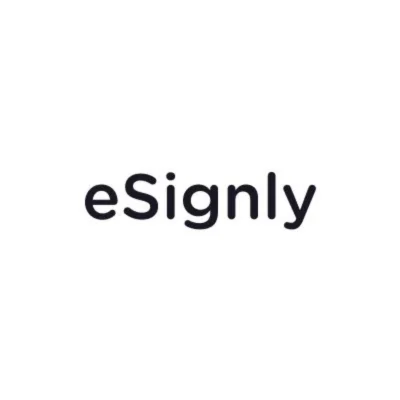
This is a low-cost yet good alternative to DocuSign. eSignly best suits commercial and business establishments that need a stand-alone digital signature solution. The technical and digital signing process is simple and user-friendly.
Cost-wise, it is effective, as several users within a company or business establishment can sign documents by paying a single unified fee. This is possible by purchasing the Business Plan of eSignly.
Another benefit is that the platform allows editing of documents even after sending them. Customer support of eSignly is excellent. You can get 24-hour service on all days of the week through emails, calls, and live chat.
Pros:
- You can navigate and use it quite easily as a verified eSignly user. Usually, you don’t experience any technical glitches.
- You can integrate with several apps and tools including Box, Workday, Zoom, Evernote, and Salesforce.
- You can customize the settings and integrate it to fit specific sales or other business purposes.
Cons:
- Compared to DocuSign, this platform does not permit easy flow of digital signature management.
- Key management is a bit complex.
- The app’s software is not updated with the latest changes in e-signature legal norms.
eSignly Plans and Pricing:
If you’re looking for a flexible e-signature tool that works anywhere on any device, eSignly offers a straightforward tiered system — plus a 30-day free trial to test things out.
Plans at a glance (annual billing prices shown)
- Solo – Free forever: Perfect for individuals who want quick, easy e-signing with unlimited signatures, mobile apps, reminders, and support for 18+ languages. Limits include PDF requests max 5 MB.
- Professional – $10/user/month ($120 billed yearly): Adds one reusable template, real-time audit trails, support for PDF & Office files up to 10 MB, plus integrations with Box, Dropbox, Google Drive, and custom email messages.
- Business – $20/user/month ($240 billed yearly): Designed for teams with shared documents, more templates (5), larger file limits (25 MB), audit trail control, signer messaging, approval workflows, and advanced branding.
- Enterprise – $30/user/month ($360 billed yearly): For organizations needing enterprise-grade features like HIPAA compliance, 15 reusable templates, bigger file uploads (50 MB), bulk sends, in-person signing, real-time audit controls, advanced fields, dashboards, and API integrations.
What stands out?
- All plans offer unlimited signatures and strong uptime (up to 100% SLA).
- The free Solo plan is surprisingly robust for individual users starting out.
- Higher tiers add team collaboration, approval processes, and tighter security/compliance features.
- Integration options grow with the plan level, including popular cloud storage and enterprise systems.
- Payment collection is “coming soon,” so keep an eye out if that’s important to you.
Check the eSignly pricing details
Is eSignly right for me?
If you use major operational parameters, you will find it quite good. Besides, the cost is also not very high. As a result, it is right for you as an individual user. However, for big companies, it may not be ideal.
7. SignRequest

It provides a simple and low-cost alternative to DocuSign. You can upload files and sign them. You also have the benefit of moving the fields or boxes you have created using the drag-and-drop tool on SignRequest. The technical modus operandi matches that of DocuSign.
Though it does not offer as many features as DocuSign, it is gaining popularity due to its simplicity. Another major benefit of SignRequest is its broad user base: it is tailored to the needs of almost all sizes of businesses.
Pros:
- You can add logos and text to documents using a dedicated space called “Adding Fields.”
- You can easily integrate SignRequest with other platforms including TOPdesk, GSuite, Salesforce, M-Files, and Zapier.
- It offers real-time status updates of eSigned documents and papers.
Cons:
- It takes more time to respond via email.
- It lacks some of the advanced features of DocuSign, such as complex workflow customization and advanced document search.
- It takes more time to upload and process documents.
SignRequest Plans and Pricing:
If you’re looking for a lightweight, no-fuss e-signature solution, SignRequest keeps things simple. You can try either plan with a 14-day free trial — no upfront commitment.
- Professional – $9/user/month: This is the starter option. It includes unlimited documents, 5 templates, secure audit trails, and basic branding. You’re limited to 1 team with up to 5 users, but it supports 17 languages.
- Business – $15/user/month: Adds a lot more flexibility: unlimited teams and users, unlimited templates, bulk sending, and custom landing pages. You also get advanced options like signer attachments, SMS verification, custom signing order, and premium integrations.
What’s worth noting?
- Both plans include unlimited documents and support a 14-day free trial.
- The jump from Professional to Business mainly unlocks collaboration tools, automation, and integrations.
- If you only need basic signing with a small team, Professional works just fine.
- If you need bulk sending, advanced workflows, or external app connections — go for Business.
Check the SignRequest pricing details
Is SignRequest right for me?
This is quite a useful and low-budget platform. You can sign 10 documents a month for free. This means you can save money if you are not running a large company. It should suit you well.
8. SignEasy
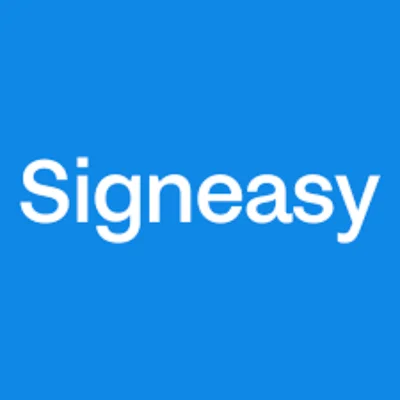
If you want to use your handset or mobile phone to sign documents (mobile eSigning) and send them, SignEasy can be a great option. It is equipped with several other useful features, including offline signature collection and digital audit trail checking.
Small business owners find it very useful due to both its features and low cost. It easily integrates with Salesforce, Slack, Google Drive, and Freshworks. Using this platform, the team members of a company or an individual can easily navigate and execute tasks without formal training. This is because the platform’s interface is very simple and users don’t require any special training.
Pros:
- It gives you the freedom to sign and send documents from anywhere using a mobile phone or any other device.
- The digital method of collecting signatures online is extremely secure. Security compliance is also maintained.
- The ability to share several signed documents in a multi-party setting is another benefit of this platform.
Cons:
- It lacks advanced features like those of DocuSign. As a result, document workflow suffers.
- It is not useful for high volumes of documents as it requires individual emailing.
- Sometimes, signed documents are not uploaded properly, requiring another attempt.
SignEasy Plans and Pricing
SignEasy offers flexible plans with a 14-day free trial and a 100-day money-back guarantee — no credit card needed to start.
- Free – $0: Great for one-time or occasional signatures. No frills, just quick access.
- Personal – $10/month ($120/year): Send up to 5 contracts monthly. Ideal for freelancers who need mobile access and Google/Microsoft app integration.
- Business – $20/user/month ($240/year): Best for small teams. Offers unlimited document sends, reminders, templates, AI contract summaries, cloud sync, and admin tools.
- Business Pro – $30/user/month ($360/year): Adds team controls, signer-level security, usage tracking, and integrations with HubSpot and SharePoint.
- Custom – Contact sales: For larger teams needing SSO, HIPAA, SMS notifications, and onboarding support.
Check the SignEasy pricing details
Is SignEasy right for me?
This can be a good choice for you. It gives you the flexibility to upload signed files on your handset anytime and anywhere. Several other platforms don’t offer this feature. Start free, upgrade as you grow. Business hits the sweet spot; Pro is for teams that need full control.
9. Yousign
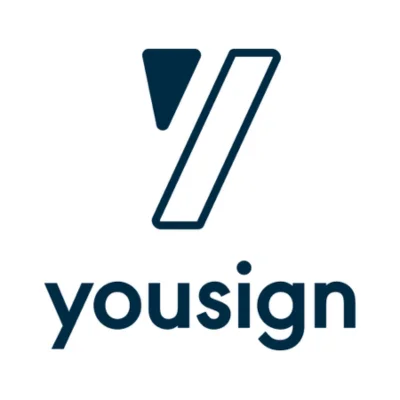
This is a good alternative to DocuSign. It allows you to sign as many documents as needed. Legally binding eSigned documents can be generated in PDF format. It is useful for business teams as well as individuals. If your company is using Yousign services, team members can easily share legal agreements that have already been signed.
The operational process of this platform is quite fast. As a result, end-to-end business tasks are completed quickly. It strictly adheres to international data protection and privacy laws applicable in the USA and European countries.
Pros:
- It particularly suits freelancers or solo users, allowing them to sign a large number of documents without extra cost.
- It offers features like SMS authentication, Qualified Signatures, and document archiving.
- It has high operational speed, enabling you to create, sign, and send legally binding documents quickly.
Cons:
- It suffers from field adjustment limitations, which can be problematic.
- It offers a 14-day free trial, but this trial does not include signature requests, defeating the purpose.
- Occasionally, you may face accessibility issues, as this platform does not have a native mobile application.
Yousign Plans and Pricing:
Yousign keeps its pricing simple and flexible — whether you just need to sign a couple of documents or want to manage full team workflows. You can pay monthly, or save with annual billing (2 months free).
- Free – €0/month: Perfect for getting started. Includes 2 signature requests per month, unlimited self-signing, and basic features like inbox access and reminders.
- One – €11/month (1 user): Designed for freelancers or solo users with light signing needs. Offers 10 requests/month, real-time tracking, basic fields, and custom branding.
- Plus – €30/user/month: For small teams or regular senders. Unlocks unlimited signatures, templates, SMS verification, approvals, and integrations with Zapier and HubSpot.
- Pro – €48/user/month: Built for teams that need automation and custom workflows. Adds bulk sending, document collection, workspaces, and full access to advanced features.
Check the YouSign pricing details
Is Yousign right for me?
Yousign can be a good alternative to DocuSign. It may not be the best fit for large company teams but is suitable for freelancers or solo users. Use Free or One plan if you only send occasionally. Plus is best for growing teams, while Pro is ideal for automating high-volume workflows.
10. Xodo Sign

This is a cloud-based platform previously known as Eversign. It offers the benefit of ease of use and quick signing of legal documents, with fast transmission. Xodo Sign suits both small sales platforms or companies and freelancers.
However, it only provides electronic signature delivery, not a fully automated contract signing process. The user-friendly interface allows even those unfamiliar with technical aspects of eSigning to use it easily. Xodo Sign provides a dashboard that lets you track documents after signing and sending them.
Pros:
- You can view the signature history and list of created documents.
- Xodo Sign allows for custom branding, which is useful for businesses.
- It integrates easily with platforms such as Google Drive, Gmail, and Slack.
Cons:
- It has limited functionality, which may not suit large companies.
- Technologically, it is inferior to DocuSign and not ideal for large-scale use.
- Customer service is not rated highly. It can take a long time to get a response to specific issues.
Xodo Sign Plans and Pricing:
Xodo Sign offers a flexible lineup for individuals, businesses, and developers. You can try the Professional plan free for 14 days — no credit card needed.
- Basic – $10/mo (yearly) | $20/mo (monthly): Good for small teams. Unlimited documents, 3 templates, mobile access, and integrations.
- Professional – $16/mo (yearly) | $32/mo (monthly): Ideal for growing businesses. Adds unlimited templates, bulk send, SMS credits, in-person signing, branding & premium support.
- API – $0.12–$2.50 per doc: Built for high-volume eSignature workflows with full automation and integration support.
- Enterprise – Custom pricing: Advanced tools, team controls, and dedicated support for large organizations.
Check the XodoSign pricing details
Is Xodo Sign right for me?
It can be a suitable choice, as it is easy to use and generally operates without delays. If you are a solo user or freelancer, it may suit you well. Start with Basic, upgrade to Professional for serious sending. API & Enterprise scale as your needs grow.
FAQs About DocuSign Alternatives
Is there any limit to signing documents with DocuSign?
Yes, you cannot sign more than five documents (known as Envelopes in DocuSign terminology) under the cheapest pricing plan.
Is DocuSign a costly eSignature platform?
DocuSign has several pricing models, so you can choose one based on your requirements. The starting price is $10 per month, which is suitable for smaller business establishments. However, you must upgrade and pay more for higher-volume eSignature needs. Pricing varies depending on features.
Which process should I follow to download documents?
Follow these steps:
- Log in to your DocuSign account
- Open the specific document you want to save after completing it
- Go to the menu (at the top of the page) and click the icon with the downward arrow
- Choose the location on your computer where you want to download the file
Is there any specific difference between 'Send' and 'Sign' in DocuSign?
Yes, the differences are:
- Sign: Use this when you are sending a document that includes your own signature.
- Send: Use this when you are sending a document to others for their signatures.
Conclusion
We’ve walked you through some of the best DocuSign alternatives out there in 2026, sharing their main features, pricing, and who they’re best for. Whether you want something more budget-friendly, packed with extra security, or just easier to use, there’s definitely an option here that could work for you.
If this guide helped or if you have any questions we didn’t get to, drop a comment below—we’d love to hear from you!
And if you’re on the hunt for other software recommendations or alternatives to a different tool, just give us a shout. We’re here to test, compare, and share honest advice so you can find what truly fits your needs. Your feedback helps us decide what to cover next!
Hi there! I’m Nick Cullen. As the Senior Content Editor with Solution Suggest, my responsibility is to scrutinize and refine our articles and reviews, focusing on software solutions, games, apps, and websites. I’m dedicated to delivering reliable and enlightening content that offers viable alternatives to your current digital tools. If you have any suggestions or inquiries, you can reach me at editor@solutionsuggest.com. Also, I invite you to connect with me on LinkedIn!

